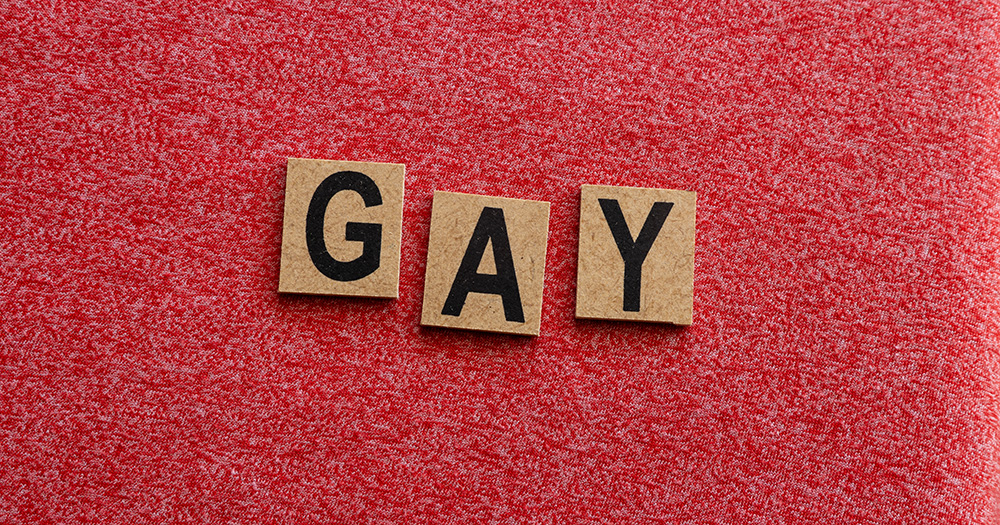Contrary to the famous ‘sticks and stones’ saying, words can certainly hurt, especially when delivered with certain tones and intent. However, the power of these insults can also be taken away and Colin Daly outlines how reclaiming anti-LGBTQ+ language can push back against homophobia.
“Fat queer”.
Two little words that when aimed at me are true. One, obviously so, the other not so obvious at all.
It’s not obvious that I’m queer per se but if I’m walking out of an Old Compton Street gay bar or PantiBar, wrapped around another man, then it becomes difficult to deny. But its ability to offend is determined by who said it and how they said it.
When I was growing up, homosexuals were queers or benders. You could use the words interchangeably. Sometimes you might come across the word ‘f*ggot’ but I’m not entirely convinced that those who used it in those days, in Ireland anyway, actually knew that it had a homophobic meaning. It was just meant to be offensive.
On the streets, Bartley Dunne (BD) was known as a queers’ pub. You were warned by the straight cognoscenti to be careful going there in case you got jumped on by the rabid queers (How did they know?) Well, I went to BD’s on many, many, occasions and, much to my utter chagrin, I never got jumped on by anyone for any reason. However, I digress.
Offensive language is meant by definition to offend and hurt and there is a fairly large lexicon for a person to dip into to spew homophobia. I won’t go into them all. I think we all know them, or most of them, by now.
Of course, these days we have the phenomenon of the victims taking control of the words by intentionally using them reflexively against themselves. This is also a technique used against racist slurs or any other form of verbal abuse.
Insults motivated by homophobia don’t land too hard if I use the language or words in a self-referential manner. If someone calls me a fat queer I can simply tell them that I know that already and ask what their point is. But I sometimes wonder if this is the correct approach because it lends the words a kind of distorted dignity and, of course, it perpetuates them in their offensiveness by making them, or their ability to insult, part of the common currency of the English language.
Many would object to attempts at consigning words to the dustbin because of its chilling effect on freedom of speech. Additionally, words like queer have other meanings in the lexicon of the English language and these meanings have nothing to do with sex or homosexuality.
The word that seems to most mystify people, both within and without the queer community, is the word ‘gay’ – a respectable alternative to queer or f*ggot. Why gay…are we always happy or glad about life? Hardly.
For the record, the word ‘gay’ is a backronym for “Good As You”. When the fight for equal rights for homosexuals began in the USA in the ’60s, the protestors would carry posters proclaiming to the straight audience and other onlookers:
Good (G)
As (A)
You (Y)
And so GAY became a defining word for homosexuals.
We did not steal the word despite what some might assert. It is, however, not really an abusive term. Rather it is a polite word to reference LGBTQ+ people as a group or subset of society. It is part of the lingua franca of the global LGBTQ+ community and lends itself to many languages. It is as universal as the pink triangle.
The old saying goes: “Sticks and stones may break my bones but words will never harm me”. This, I would argue, is not quite true.
Words can be very harmful, especially if lies are being told. But what I am really talking about is the pain and anguish that a few well-placed comments can cause if they are worded and phrased with the singular intent to destroy someone’s trust and self-image.
This seems to be becoming more and more frequent on the internet and there seems very little that can be done about it.
Some words have become taboo in society after years of being used as vicious slurs against religious and racial minorities. It takes a long time and a great deal of effort to make the majority of people accept that some words, or their applications, are simply not acceptable.
Homophobia seems to be getting dealt with, to some degree, in certain spheres. Perhaps we should clamp down on it more severely in general social intercourse.
© 2025 GCN (Gay Community News). All rights reserved.
Support GCN
GCN is a free, vital resource for Ireland’s LGBTQ+ community since 1988.
GCN is a trading name of National LGBT Federation CLG, a registered charity - Charity Number: 20034580.
GCN relies on the generous support of the community and allies to sustain the crucial work that we do. Producing GCN is costly, and, in an industry which has been hugely impacted by rising costs, we need your support to help sustain and grow this vital resource.
Supporting GCN for as little as €1.99 per month will help us continue our work as Ireland’s free, independent LGBTQ+ media.
